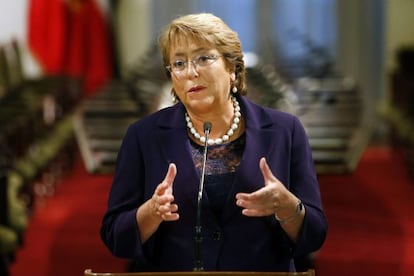Chile’s business sector blames the economic slowdown on reforms
President Michelle Bachelet rejects claims and says deep change is needed to end inequality


Economic figures released six months after Michelle Bachelet’s re-election in Chile are increasing the sense of anxiety among sectors who are wary of the Socialist president’s ambitious new reform program.
Statistics show that the pace of job creation has slowed down, while the Central Bank on Wednesday reduced its growth forecast for what is left of 2014 to somewhere between 1.75 and 2.25 percent, although a gradual recovery is expected for next year.
Meanwhile, the government and the opposition are at odds over what is causing a slowdown that has focused the attention of Chile’s political and business leaders.
We need human capital for the good of the Chilean economy, not just out of a sense of justice” President Michelle Bachelet
The Bachelet administration says that low investment and growth levels can be explained partly by external factors: other countries that rely on exports of primary products, such as Peru, are going through similar situations because of adverse international conditions.
But the government admits that there are also domestic problems, such as the high price of energy and the low price of copper, which has put a halt on several mining projects.
In any case, Bachelet and her Cabinet hold, these problems did not begin in March but rather in the last quarter of 2012, under the previous president, Sebastián Piñera.
But conservatives and business leaders claim that the profound changes that the executive is planning – to education, to the Constitution and to the tax regime, among others – have created a scenario that is harming the economy.
“The figures confirm the climate of uncertainty that has gripped the country as a result of the debate on structural reforms,” said Patricio Crespo, leader of the agricultural federation Sociedad Nacional de Agricultura.
The president of the Confederation of Production and Trade, Andrés Santa Cruz, said that business leaders are willing to work together with La Moneda, the seat of government, but that it is necessary to “regain trust and remove uncertainty.”
Former president Piñera, who ruled the country from March 2010 to March 2014, in between Bachelet’s two terms in office, has criticized her policies. “We are still in time to change direction,” he said a few weeks ago.
On Monday, the president announced a plan to reinforce public and private investment. Her measures aim to create 11,500 new jobs and reduce the unemployment rate down from the current 6.5 percent, a 0.3 percent rise from a year ago.
The figures confirm the climate of uncertainty that has gripped the country”
Patricio Crespo, business leader
The program contemplates injecting 500 million dollars into the economy between now and year’s end, and ramping up infrastructure concessions to $2.6 billion by March 2016.
“Governments are not there to complain about their problems, but to seek solutions in the short run,” said the Socialist leader, whose approval ratings are 49 percent according to a survey by Adimark released on Thursday. This figure represents a five-point drop from a month ago.
In an interview aired Tuesday on the state broadcaster Televisión Nacional, Bachelet said that “some sectors never want change and prefer the status quo, because they live well that way.”
The president defended her reform package, particularly the changes to the tax system that will raise money to finance education reform.
“We need human capital for the good of the Chilean economy, not just out of a sense of justice,” she said. “Social peace cannot last long if the brutal differences between those who have more and those who have less remain the same or become even greater.”
Bachelet also tried to convey that the government will be prudent to avoid hurting the economy despite promoting the deepest reforms in the last 40 years.
“Chile is a serious, responsible country, and [these reforms] are not going to make it collapse.”







































